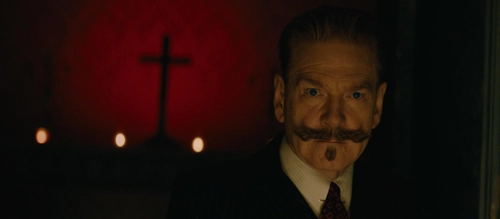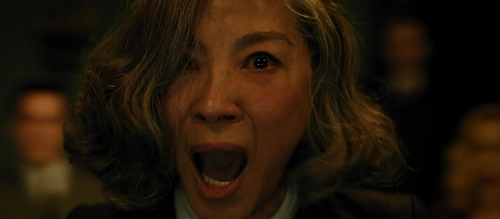A Haunting in Venice (2023) Review

A Haunting in Venice (2023)
Director: Kenneth Branagh
Screenwriter: Michael Green
Starring: Kenneth Branagh, Tina Fey, Camille Cottin, Kelly Reiley, Jude Hill, Jamie Dornan, Michelle Yeoh, Emma Laird, Kyle Allen
Following two previous adaptations of Agatha Christie’s beloved Poirot novels, featuring the eponymous detective, you’d think there’d be a bit of a break. There’s no slowing down this particular train, however. After 2017’s Murder on the Orient Express and 2022’s Death on the Nile, the next one comes in quick succession. All the more impressive as Branagh had brought out Belfast in the interim. What was it that made him feel the need to bring out this film 18 months after the last one? Why take one of the final Poirot novels, “Hallowe’en Party”, change the location from the quaint English countryside to a palazzo in the middle of Venice, shove most of the story into one night in one location (budget and scheduling probably answer that), and pretty much gut the novel save for a few moments of the book’s iconography? Why did the creative minds, writers and directors and producers, decide to make it very much a horror movie with a detective story plotline?
All of these questions bounce from wall to wall as you sit in the comfy red seats of the cinema to watch A Haunting in Venice. Good questions they are too, because many of the answers make no sense. When trying to fathom how much of this story of murder at a Halloween party is being kept, when watching Branagh’s Poirot get his head dunked in the apple bobbing bowl that is so central to the source material before a murder is committed in the dark, one realises just how far removed this will be from the book. Not only is it a departure from Christie, it’s a departure from the approach of the previous two films, which were very faithful to the original material, and sometimes criticised by critics for being so. They looked glorious, but didn’t offer much that you could consider new. Of course they didn’t. With Orient, you can’t really change much, and as for Nile, well… this is Agatha Christie, after all. Viewers would crucify anyone who meddled with their precious whodunnit.
And so suddenly we have a film which massively swings the other way, seemingly as a reaction to the mixed reviews of the previous films. The tone shifts to that of a horror movie, the big budget ghost film being very much the zeitgeist of Hollywood currently (we have James Wan and Leigh Whannell to thank for that) and undoubtedly being one of the motivators for the change. The sumptuous luxury of Orient and the desert sun of Nile becomes gloomy, dingy corridors, shadows running past flickering lamps. Everyone looks dour and depressed throughout. You can hardly see anyone’s face. Everything looks the same: bland and dull and dusty and monotonous on the eyes. If it were filmed in black and white, it would be better; at least we’d be able to see people’s faces half the time, and work out who’s who.
With a Halloween theme but bigger Halloween movies to come out in October, it’s a shame the film couldn’t be allowed another few weeks to get the editing right and be released next month, because it’s off in almost every scene. It’s too quick, every cut to an establishing shot comes too suddenly, and some scenes cut around close-ups and mids for conversations even more disastrously than Bohemian Rhapsody. It’s a big-budget experiment, but created hastily and seemingly without much care or consideration for anything on the technical side. It feels sloppy.
Amidst all the detective work and fleeing from ghosts he doesn’t believe in, Branagh’s Poirot has never come across more unconvincingly. He is seemingly bored throughout, either monotonous and thoroughly uncharming, or gasping at shadows. One should never compare portrayals of the same character, because they are in different times for different mediums, but David Suchet’s Poirot for the ITV series never failed to make his version of the character kind. Eccentric, yes, but overwhelmingly kind and human. This Poirot is anything but; he has become simply one of a thousand detectives with little quirks, and anything of the Christie invention that was there in Orient Express has long faded away by now.

Additionally, what is meant to be a test on Poirot’s Catholic faith and belief or non-belief in spirits fails to spark any kind of real conversation beyond the surface level mentions of gods and a quote from the bible or two. Perhaps this is why the location was shifted to Venice; Italy being the location of the Vatican, Catholicism. But to not even mention that Poirot is Catholic by birth seems like a misstep, and an attempt to appropriate the Greek paganism of the novel to something more in keeping with modern trends is redundant and empty of substance.
All this isn’t to say that the film is a total dud. One or two jump scares, though forced, manage to surprise. Michelle Yeoh (Everything Everywhere All at Once) is the star of the show when she’s on screen, and the dynamic between her and Jude Hill’s young Leopold (a completely different character to how he is presented in the novel, of course) is incredibly interesting and perhaps the most fascinating aspect of the story. It’s just a shame that it had to adhere to being a Poirot story. One could easily imagine that, with a few changes to eradicate the iconography, you simply import a different detective and it’s no more an Agatha Christie novel than this review is a work of literary genius on par with Shakespeare.
As it is, it doesn’t feel like Christie, and doesn’t even feel like the first two films. It is a hasty attempt to right wrongs others have complained about, a reactionary film to outside influences. And it’s all the worse and more forgettable as a result. In isolation, it isn’t the worst horror detective thriller ever made – if you want a good Halloween thriller that isn’t the franchise of the same name, the 1959 William Castle film House on Haunted Hill is still the way to go – but a film is never made in isolation. It is a collective creation, subject to outside influences that this text wears on its sleeve. Once we do our own detecting, we can see clearly, and the universe has its order restored. One thinks there might be the ghost of something unique here, but it is just a magic trick.
Score: 10/24

